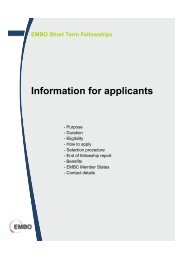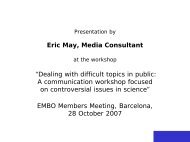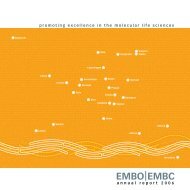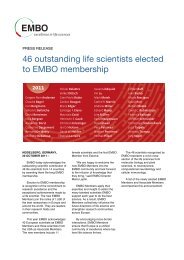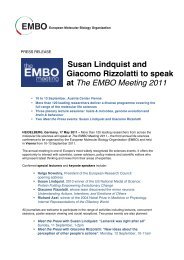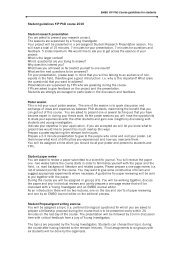EMBO Fellows Meeting 2012
EMBO Fellows Meeting 2012
EMBO Fellows Meeting 2012
You also want an ePaper? Increase the reach of your titles
YUMPU automatically turns print PDFs into web optimized ePapers that Google loves.
Jeroen Bussmann<br />
<strong>EMBO</strong> <strong>Fellows</strong> <strong>Meeting</strong> <strong>2012</strong><br />
Regulation of brain angiogenesis by chemokine signaling<br />
Abstract<br />
During angiogenic sprouting, newly forming blood vessels need to connect to the existing vasculature in order<br />
to establish a functional circulatory loop. Previous studies have implicated genetic pathways, such as VEGF and<br />
Notch signaling, in controlling angiogenesis. I have studied the regulation of angiogenesis in the zebrafish<br />
hindbrain, and found that chemokine signaling specifically controls arterial-venous network formation in the<br />
brain. Zebrafish mutants for the chemokine receptor cxcr4a or its ligand cxcl12b establish a decreased number<br />
of arterial-venous connections, leading to the formation of an unperfused and interconnected blood vessel<br />
network. Expression of cxcr4a in newly forming brain capillaries is negatively regulated by blood flow.<br />
Accordingly, unperfused vessels continue to express cxcr4a, whereas connection of these vessels to the<br />
arterial circulation leads to rapid downregulation of cxcr4a expression and loss of angiogenic characteristics in<br />
endothelial cells, such as filopodia formation. Together, my findings indicate that hemodynamics, in addition to<br />
genetic pathways, influence vascular morphogenesis by regulating the expression of a proangiogenic factor<br />
that is necessary for the correct pathfinding of sprouting brain capillaries.<br />
14-17 June <strong>2012</strong>, Heidelberg, Germany




